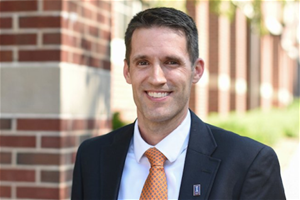Aug 26, 2020
Gies Business appoints first Director of Social Innovation
Gies College of Business is expanding its commitment to purpose-driven entrepreneurship by appointing Benjamin Lough, associate professor in the School of Social Work, as the College’s first director of social innovation. In this position, Lough will help Gies broaden its curricular offerings around social innovation, enhance experiential learning opportunities for students, and strengthen the College’s external strategic networks and partnerships to deliver social innovation.
 “Our students have a strong desire to be changemakers, with a passion to pursue purpose-driven careers that contribute to environmental sustainability, inclusive health, education, and other social purpose work,” said Lough. “They aren’t only interested in changing the world; they also want to drive the way social change is made. Broadening the content on social innovation and entrepreneurship gives them the skills they need to enact social change from the bottom up.”
“Our students have a strong desire to be changemakers, with a passion to pursue purpose-driven careers that contribute to environmental sustainability, inclusive health, education, and other social purpose work,” said Lough. “They aren’t only interested in changing the world; they also want to drive the way social change is made. Broadening the content on social innovation and entrepreneurship gives them the skills they need to enact social change from the bottom up.”
The vibrant entrepreneurial spirit at Gies nurtures students and gives them the confidence to develop their next big idea. For some, it could be launching a startup or developing a product; for others, it’s starting a nonprofit or social enterprise to answer a social need. The College’s renowned faculty share their wisdom and expertise to enable students to uncover their passion and purpose.
“At Gies, we believe in Business on Purpose. Part of our purpose is to help make the world a better place,” said Associate Dean for Innovation and Chief Disruption Officer Robert Brunner, who oversees the College’s entrepreneurial initiatives. “As we look to disrupt and innovate within the world, one of the most important areas to focus on is society and the broader world. Ben is a world-class researcher in social innovation and an experienced team builder who will help us become the premier site for social impact and change.”
Lough joins Gies in addition to his appointment with the University of Illinois’ School of Social Work, where he has spent the last nine years. For the last three years, he directed the Master of Social Work program. He earned his bachelors in sociology and his master’s in social work from Brigham Young University, and his PhD in 2010 from Washington University in St. Louis. He teaches courses on the nonprofit sector, social entrepreneurship/enterprise, and organizational strategies for social change. His research and teaching interests include international volunteering, community development, nonprofit management, social innovation, and organizational social work practice.
Under Lough’s guidance, Gies will expand its curriculum in the areas of social innovation and entrepreneurship, nonprofit and social purpose management, cultural and arts management and leadership, and designing for social impact. He will also help advise student groups interested in creating innovative nonprofit, social enterprise, philanthropic solutions for social change. This will include connecting student teams with opportunities to participate in the broader campus entrepreneurial ecosystem like the College’s iVenture Accelerator and the COZAD New Venture Challenge.
For more than 100 years, Gies College of Business has provided an environment and the resources to foster meaningful action in students. This environment allows students to follow their own path and put their individual purposes into action to make the world a better place. Gies puts this into practice through specialty programs, where students explore broad, international, and cross-disciplinary opportunities; learning by doing, where students learn how the world works and explore their place in it; a flexible and unique student experience rather than a one-size-fits-all approach; and a collaborative environment, where upperclassmen, faculty, and alumni mentor students and help students on their path to purpose.
“Gies students already have a solid foundation of innovative and mission-driven content,” said Lough. “With this additional investment, they’ll have more opportunities to create both economic and social value. Whether students are interested in launching new social ventures, improving sustainable business practices, or leading and consulting nonprofits, investments in social innovation will help students design market-based solutions to help solve society’s most pressing social and environmental issues.”
